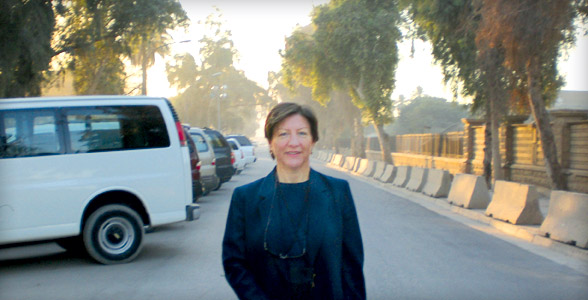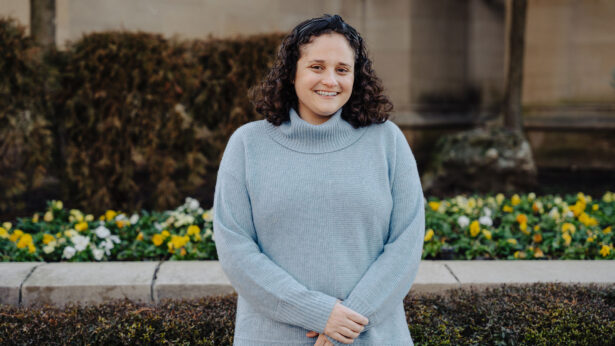By Bud Grimes
It must be true that opposites attract. Garry and Betsy Phillips didn’t agree on much of anything before they married. But today the couple agrees on one thing for sure—the United States must succeed in stabilizing a democratic government in Iraq. The stability of the whole Middle East hangs in the balance.
Garry (Martin ’77) and Betsy are directly involved in nurturing a democracy in the cradle of civilization. He is developing a U.S. Marshals Service–type organization for judicial security, while Betsy directs the Office of Joint Strategic Planning and Assessment at the U.S. Embassy in Baghdad.
The Phillipses come from distinctly different backgrounds. He is a native of Paris, Tennessee, while she was reared in Michigan. Garry Phillips began a 20-year navy career shortly after graduating from high school and served embassy assignments in Tokyo and Sri Lanka. He retired from the navy in 1975, having completed 2 years of college while on active duty. He was accepted by UT Martin and graduated in 1977 with majors in political science and English. He taught English at Westview High School in Martin for 2 years and then worked in UT Martin’s Office of International Programs, where he taught English as a second language.
The two met at the University of West Florida in Pensacola, where they both earned master’s degrees in public administration. Both were selected for the Presidential Management Intern Program, which seeks about 200 people a year for federal government mid-management positions. When they arrived in Washington, neither knew anyone else, so they started spending a lot of time together and eventually married in 1985.
The Phillipses accumulated significant federal government experience before accepting their current appointments in Iraq. They share strong nonpartisan views about what has happened—and might happen—in Iraq, and both believe they can contribute to stability in the region by serving in this volatile part of the world. “I think what the United States and the multinational forces are doing in Iraq is very important to stability, not only in Iraq but also in the entire Middle East,” Garry Phillips says.
Betsy Phillips’s office is unique to the U.S. Embassy in Baghdad, she says, in that the embassy works with the U.S. military and the other multinational forces in Iraq on long-range planning.
The plan is updated regularly in cooperation with the military, and besides managing this plan, the office’s seven-member staff engages in “red-team analysis,” a kind of devil’s advocate exercise in which assumptions are challenged. “It’s really very, very unusual,” Betsy says of the process. “We take a look at a lot of the statistics and try to determine what’s happening in the country based upon what we’re seeing.”
Although the challenges in Iraq are huge, Betsy Phillips says progress is being made. She says the Iraqis are moving at “warp speed” to establish an effective government, considering how many years it took the United States to accomplish the same thing. Iraq is divided into 18 provinces, which are roughly the equivalent of the states of the U.S. The good news, Garry Phillips says, is that 16 of 18 are doing well. “We are, one by one, ‘turning over’ those provinces to Iraqi local governments.
We’re stepping back militarily, and we’ve trained the army and police, who are making positive strides in maintaining order. The local governments are operating.”
But while some things are working well, other aspects of the fledgling democracy are not. Crucial to the new government’s success is a functioning effective judicial system, and Garry Phillips’s main focus is to establish plans for a judicial protection service. Modeled after the U.S. Marshals Service, his group has developed a plan for protecting judges, witnesses, lawyers, and courthouses.
Security concerns are well founded. It’s not unusual to see heavily armed people in Baghdad courthouses. More than 30 judges and some 40 bodyguards have been assassinated since 2003. Unfortunately, those currently providing protection in the judicial system are not prepared for the job. “They’re either untrained or not well trained,” Garry Phillips says. “We’re trying to pull them together and make them a unified service.”
The Phillipses don’t have ordinary jobs, but then life in Iraq is anything but ordinary. They live in a trailer-like hooch that’s about 30 feet by 10 feet, with two rooms separated by a bathroom in the middle. They walk to work and arrive in their embassy offices by about 7 a.m. The three-story embassy building was once Saddam Hussein’s palace. The space Garry Phillips shares with about 40 other people was Hussein’s decision room, accented by a painting of Scud missiles “flying off into the air. It’s kind of garish,” he says.
He describes Iraq as “like a linchpin or a keystone in the Middle East,” with its population about 70 percent Shiite and 30 percent Sunni. “It is the only Arab country in the Middle East that is ruled by Shiites,” he says. Other surrounding countries—Kuwait, Saudi Arabia, Jordan, and Syria—are Sunni.
“To the east is Iran, which is Persian rather than Arab, but Shiite, so Iran has an interest in Iraq holding its own as a Shiite nation. Iran is sitting there just boiling and bubbling,” Garry Phillips says. “If Iraq is not stable, the Middle East is not going to be stable.”
The Phillipses won’t forecast the future, but both have ideas about what might happen several years out. “I think five years from now, you’ll still have a struggling democracy,” Betsy Phillips says. “We will have gone through at least one, maybe two more elections, which is an unfamiliar concept to Arab nations. You’ll probably find the provinces much more powerful than the national government in being able to take care of themselves.”
Garry’s work to establish a judicial protection system will be a key to democracy and how well it works. “Without the courts and the judges being able to function, the rule of law is pretty much hopeless,” he says. “That’s what democratic or representational government is all about—being able to make laws, enforce them, and have them judged appropriately. So, if rule of law fails, the whole thing fails.”
(Editor’s note: This interview was conducted on November 29, 2007. Because the situation in the Middle East is fluid, please consult recent news reports for current information about Iraq and events in this part of the world.)



